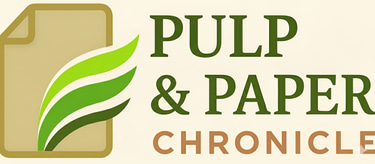About Rajasekhar V- COO, Al Jawdah Paper, KSA
Rajasekar Veerichetty is the Chief Operating Officer of Al Jawdah Paper, where he oversees the company’s operations, strategic initiatives, and overall business performance. With a career spanning over 33 years in the manufacturing and paper industry, Rajasekar has built a reputation for operational excellence, innovation, and results-driven leadership.


1. Al Jawdah Paper is a relatively new manufacturer in Saudi Arabia. What makes the company stand out in the Kingdom's pulp and paper industry?
Al Jawdah Paper stands as one of the most promising new paper manufacturers in Saudi Arabia, built on a foundation of quality, sustainability, and innovation. From day one, we have committed ourselves to the highest environmental standards, embracing circular economy principles by converting wastepaper into high-value products. With a strong focus on safety, resource efficiency, and the well-being of both people and planet, we integrate the latest technology to deliver world-class production quality. By combining operational excellence with environmental responsibility, Al Jawdah Paper is positioning itself as a benchmark for modern papermaking in the region.
2. As COO, how do you ensure operational excellence across Al Jawdah Paper's manufacturing and supply chain processes?
As COO, I view operational excellence as a continuous cycle of efficiency, quality, and accountability. At Al Jawdah Paper, we have established structured systems that integrate best practices in production planning, supply chain coordination, and quality control. My focus is on ensuring cross-functional alignment — from procurement and logistics to manufacturing and customer delivery — so that every process supports our broader business objectives. Regular performance reviews, lean manufacturing practices, and technology-driven monitoring help us maintain consistency and agility in our operations.
3. What have been the most significant operational challenges in the pulp and paper industry recently, and how has Al Jawdah Paper addressed them?
The industry has faced multiple challenges, including supply chain disruptions, rising raw material costs, and energy price volatility. At Al Jawdah Paper, we proactively address these issues through long-term supplier partnerships, strategic procurement planning, and exploring alternative raw materials. We also invest in energy-efficient systems to mitigate rising costs. By staying agile and adaptive, we turn challenges into opportunities for operational improvement while maintaining our commitment to customer reliability.
4. How does Al Jawdah Paper balance productivity improvements with sustainability and environmental responsibility in its operations?
Our philosophy is that productivity and sustainability are not opposing goals, but complementary ones. At Al Jawdah Paper, every productivity improvement initiative is evaluated through a sustainability lens. We recycle wastepaper as our primary raw material, operate advanced effluent treatment systems, and continuously optimize energy and water usage. This ensures that our growth does not come at the expense of environmental responsibility — in fact, sustainability is embedded in our productivity framework and is central to our long-term competitiveness.
5. Can you share insights on how digital transformation and automation are shaping day-to-day operations at Al Jawdah Paper?
Digital transformation has been central to our operational strategy. We use automation in key areas such as process control, inventory management, and quality monitoring. Advanced data analytics allows us to track performance in real time, minimize downtime, and make informed decisions faster. These technologies not only improve efficiency but also enhance transparency and traceability across the supply chain, enabling us to deliver consistent value to our customers. The integration of smart manufacturing tools is helping us move closer toward Industry 4.0 standards in the paper sector.
6. What strategies does Al Jawdah Paper implement to maintain product quality while scaling production capacity?
Scaling production without compromising quality requires robust systems and strict discipline. At Al Jawdah Paper, we emphasize process standardization, continuous operator training, and stringent quality checkpoints at every stage of production. Our investment in advanced machinery and laboratory facilities ensures that scaling up does not dilute product performance, but rather enhances our ability to serve larger markets with reliable quality. In fact, growth and quality go hand in hand — one strengthens the other.
7. How does the company approach risk management and crisis preparedness in its operational activities?
Risk management is a core component of our operational planning. We conduct scenario-based assessments to anticipate potential risks — whether related to raw material supply, regulatory compliance, or unforeseen global disruptions. Crisis preparedness includes having backup sourcing strategies, strong inventory buffers, and safety protocols in place. During recent global supply chain disturbances, these measures allowed Al Jawdah Paper to remain resilient and reliable to our customers, demonstrating the strength of our proactive approach.
8. Could you explain the role of innovation in optimizing operational efficiency and reducing costs within Al Jawdah Paper?
Innovation drives efficiency. We constantly benchmark against global best practices and adopt new technologies that deliver higher productivity at lower costs. This includes innovative recycling methods, automation in material handling, and energy recovery systems. At Al Jawdah Paper, innovation is not limited to machinery — it extends to process re-engineering, workforce skill development, and exploring new product applications that create long-term value. By fostering a culture of continuous improvement, we ensure that innovation translates into measurable operational and financial gains.
9. What key performance indicators (KPIs) do you emphasize most to track the success of operational initiatives?
I focus on KPIs that provide a holistic view of performance. These include production efficiency, energy and water consumption per tonne, overall equipment effectiveness (OEE), customer satisfaction scores, and employee safety metrics. Financial KPIs such as cost-per-tonne and return on operational investment are equally important. Together, these indicators ensure that our operations are balanced between profitability, sustainability, and customer value — a balance that defines true operational excellence.
10. How important is workforce development and employee engagement in meeting Al Jawdah Paper's operational goals?
People are at the heart of operational excellence. No matter how advanced the systems, it is the workforce that drives performance. At Al Jawdah Paper, we invest heavily in training, skill enhancement, and employee engagement programs to ensure our people are equipped for both present and future challenges. What sets us apart is that our team is composed of professionals with international experience from world-class mills across Europe, Asia, and the Middle East. This diverse expertise enables us to benchmark against global best practices, transfer knowledge effectively, and continuously raise our standards. By empowering employees and fostering a culture of ownership, we not only improve efficiency but also build long-term loyalty and innovation within our teams.
11. Looking forward, what major operational trends or changes do you foresee impacting the pulp and paper industry in the next 5 to 10 years?
The industry is moving towards greater sustainability, circular economy practices, and digital integration. I foresee stronger emphasis on green energy, water recycling, and carbon footprint reduction as environmental regulations become stricter and customer expectations rise. At the same time, automation, artificial intelligence, and smart manufacturing will redefine how mills operate and compete. Al Jawdah Paper is preparing to embrace these changes — positioning ourselves as a future-ready company that delivers both economic value and environmental stewardship.
